This post may contain affiliate links meaning that, I may make commission if you purchase through my links. Learn More.
Setting boundaries can take a lot of strength and courage. Here are 75 boundary affirmations to encourage you to stand up for what you deserve in your life.
What Are Boundaries?
Boundaries are a vital element of healthy relationships and environments. But… what are they exactly?
Many of us have the perception that boundaries are harsh, aggressive, or stern – but they don’t have to have that negative connotation.
Boundaries are a tool for healthy relationships and interactions.
Healthy boundaries are a way to ensure that all parties in a relationship or environment feel heard, seen, respected, and safe.
People commonly view setting boundaries as an attempt to try to control another individual and their actions. However, this is not the purpose of boundaries at all.
Boundaries, rather, are a way to stand up for yourself and demand the respect you deserve in an engagement with another human being.
Boundaries do not attempt to control what others can and cannot do but, rather, tell them what you will and will not tolerate.
By setting a boundary, you are not setting rules for the other party – you are simply telling them what you will/will not accept in the relationship.
You cannot control others’ actions.
You can, however, hold the agency and control over your own boundaries.
This all sounds really great, right?
But setting boundaries can actually be really difficult and uncomfortable, especially if you are not used to it. People pleasers and peacekeepers often struggle the most with setting boundaries.
If you struggle with setting boundaries, here are 75 positive boundary affirmations to encourage you to stand up for yourself and what you need.
75 Affirmations for Setting Boundaries in Your Life
- I am allowed to set boundaries.
- It is in my best interest to set boundaries.
- I am worthy of being treated how I deserve.
- My expectations are reasonable and rational.
- I can vocalize my needs.
- I deserve to protect myself.
- My peace is valuable and I will protect it.
- I can speak my mind and still be a kind person.
- Boundaries only strengthen my relationships.
- I am enough.
- People worth my energy will respect my boundaries.
- I am capable of more than I think.
- My worth is not defined by how others treat me.
- I honor myself by speaking about my needs.
- Other people’s reaction to my boundaries is not my responsibility.
- It is okay for me to stand up for myself.
- It is okay to say no.
- I am a kind person and setting boundaries doesn’t change that.
- I am a good friend.
- My relationships will be better by setting boundaries.
- It is okay to be honest.
- It is okay to be vulnerable.
- I am safe to be myself.
- If my needs are unmet, I will speak up for myself.
- I deserve to feel valued and respected.
- I deserve to be listened to.
- Temporary discomfort is worth lasting peace.
- I can set boundaries that protect my peace.
- I stand up for what I believe.
- My worth is unwavering, no matter what.
- I am allowed to ask for what I need.
- Boundaries are helpful.
- Boundaries are important.
- I am worthy of kindness.
- I respect myself enough to set boundaries.
- It is okay to need time alone.
- I am allowed to say no.
- I don’t have to make everyone else happy.
- It is okay to put my needs first.
- I can take care of myself.
- I can show myself the same love I would show a friend.
- My friendships will benefit from healthy boundaries.
- I attract healthy relationships into my life.
- Healthy boundaries are essential.
- I am strong.
- I am confident.
- Speaking up is an act of strength.
- I am worth standing up for, so I will stand up for myself.
- Setting boundaries shows I care about the relationship.
- The more I practice setting boundaries, the easier it will be.
- I can set and enforce boundaries naturally.
- My boundaries are allowed to change.
- I allow myself to feel my emotions.
- I allow myself to express my emotions to others.
- My feelings are valid.
- I treat others with respect and they respect me as well.
- I can show others how I deserve to be treated with my boundaries.
- Healthy relationships come naturally to me.
- I am patient with myself.
- I am learning how to set healthy boundaries.
- My relationships are grateful for guiding boundaries.
- I am allowed to be strong and assertive.
- My time, energy, and emotions are worth protecting.
- I am deserving of healthy relationships.
- It is my responsibility to prioritize my happiness.
- I can own my boundaries confidently.
- I will not make excuses or apologies for my needs.
- Love, respect, and kindness flow toward me.
- I attract relationships with people that reciprocate my energy.
- I am a good friend and I deserve good friends.
- My loved ones respect me.
- I have a voice and I will use it for good.
- My happiness is in my control.
- I get to determine the treatment I accept.
- My needs are valid and deserve to be met.
How to Set Healthy Boundaries
Even with some encouraging boundary affirmations to build you up, setting boundaries can be tough – especially if it feels new to you!
As a long-time people-pleaser myself, I struggled with setting boundaries and any sense of confrontation. It brought me so much anxiety!
However, after practicing healthy boundary-setting, I know that it is the best thing I’ve done for my relationships, my happiness, and my own mental health.
If you are just getting started with setting boundaries, here are some tips I have learned through my own experiences.
6 Tips for Better Boundary-Setting
1. Pinpoint the Problem
If a boundary has been crossed, name it. Maybe you have been feeling taken advantage of or undervalued. Express that!
Try your best to not beat around the bush and state outright what is bothering you. Be direct and clear.
2. Use “I” Statements
Own your feelings! When we approach someone with accusatory “you” statements (ie. “you make me feel bad when you…”), their guard goes up. Hello, defensiveness!
This is not conducive to a healthy, productive conversation.
Instead, reframe your statements as “I feel…”
This allows you to take ownership of your own emotions while still letting them know how their actions impact you.
This tends to be better received and opens the dialogue in a healthier way.
3. Express an Alternative
After expressing what is currently bothering you or lacking in your relationship, offer a suggestion of something that could help aid in the solution.
Calling out the problem is step 1. But working towards a solution is where the change happens.
Let your friend, partner, or loved one know the behaviors that could help you feel more respected in the relationship. Be clear and direct here too.
Your wants and needs are valid and worthy of being heard.
4. Take Your Power Back
Despite what you may think, the purpose of boundaries is actually not to control another person’s actions.
Instead, boundaries empower you to take control of your own response to their actions.
For example, rather than “you can’t speak to me like that”, you can set the boundary of “I will not tolerate being spoken to in a degrading manner. When this happens, I will remove myself from this situation.”
As much as we may want to at times, we can’t control the words/actions/behaviors of those around us. We CAN, however, control our response.
Take back your power and let your loved one know what you will and will not tolerate. Those are your boundaries.
5. Uphold Your Boundaries
Oftentimes, reinforcing your boundaries is even harder than setting them.
When a boundary is crossed, it can feel really uncomfortable to follow through with the boundary previously set. But this is essential.
Even after a boundary is explicitly set, it is likely that it will be crossed.
Whether your loved one is intentionally testing the limits or unintentionally falling back into old behavior patterns, it’s very common for new boundaries to need to be reminded and reinforced.
Remain solid in your boundary. It can feel uncomfortable to have to stand up for yourself repeatedly after already setting a boundary but continue to follow through and show up for yourself.
You deserve the respect you are seeking. Don’t settle.
6. Communicate Continuously
As time goes on and relationship dynamics shift, boundaries can change too.
Keep the door open for respectful, healthy dialogue about boundaries – on both ends of the relationship!
We all want to feel respected, seen, heard, appreciated, and valued in our relationships. By welcoming continued communication, we allow all people to feel like they have the ability to get those needs met.
More Affirmation Posts You’ll Love
100 Calming Anxiety Affirmations

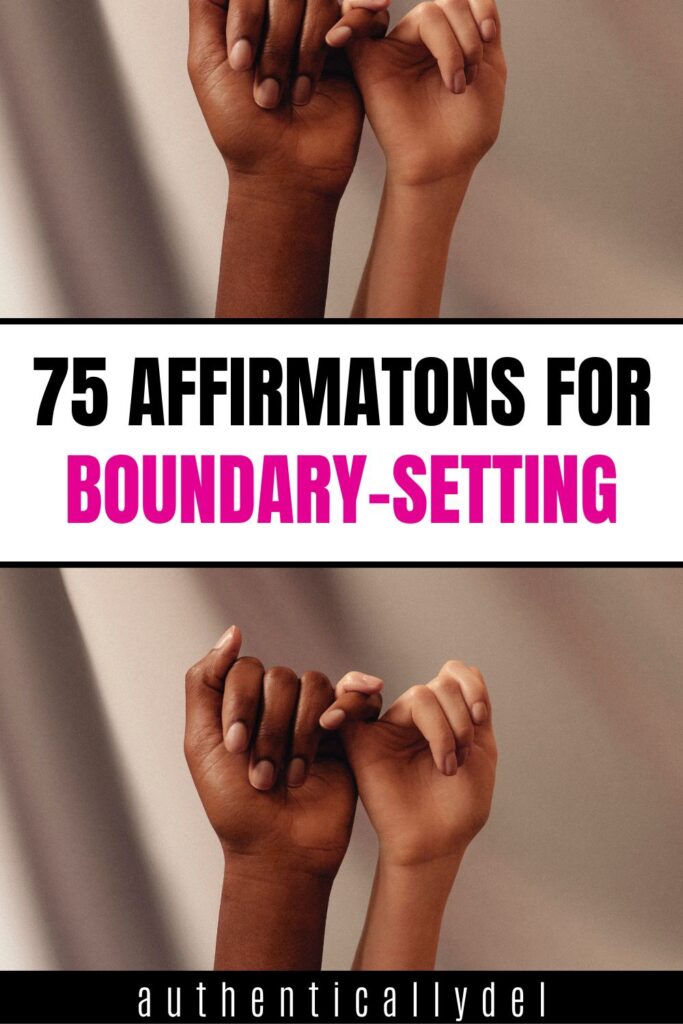
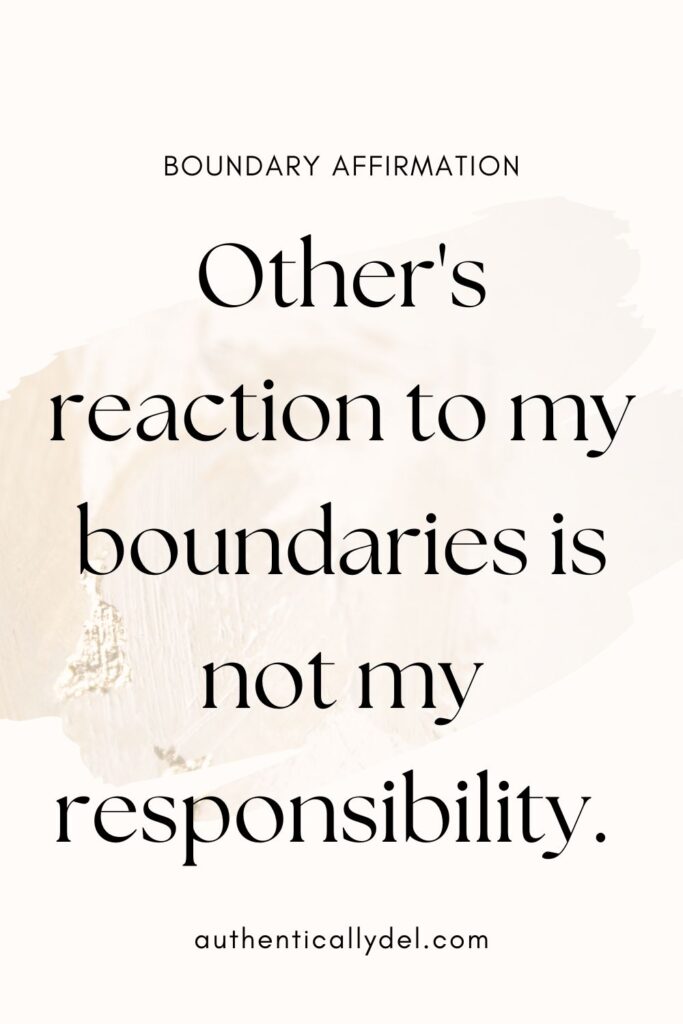
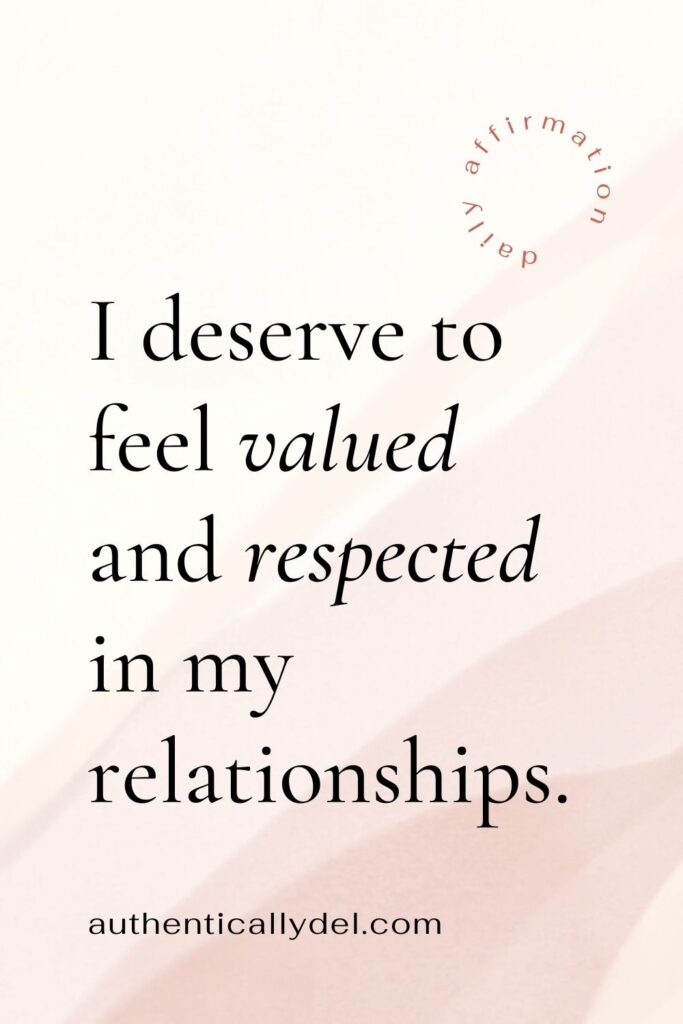
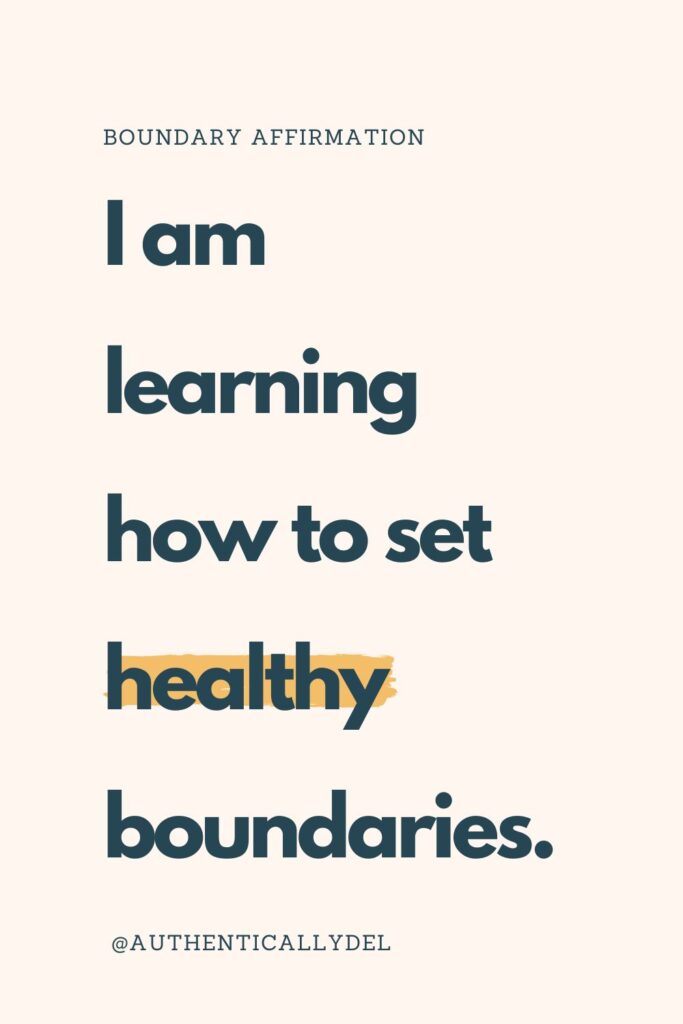
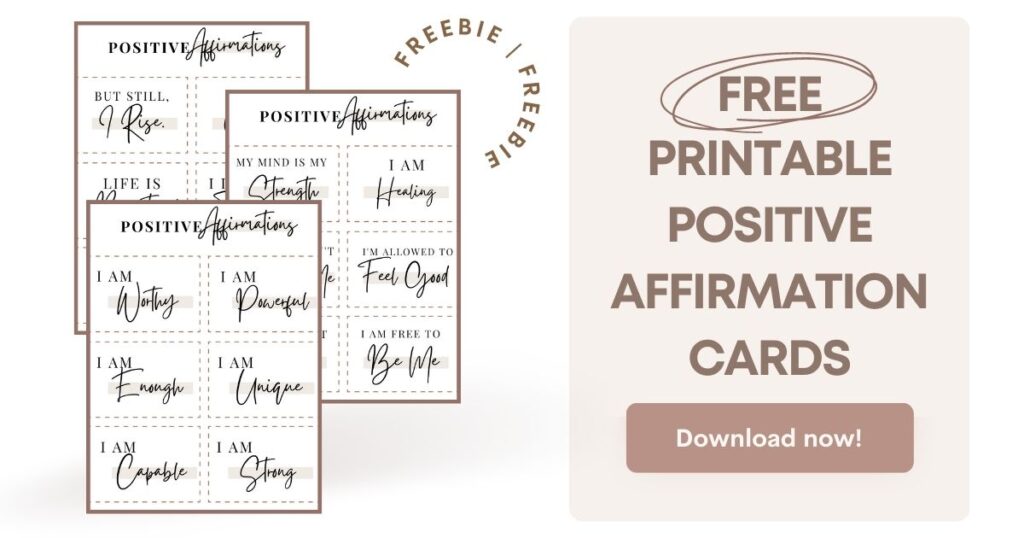
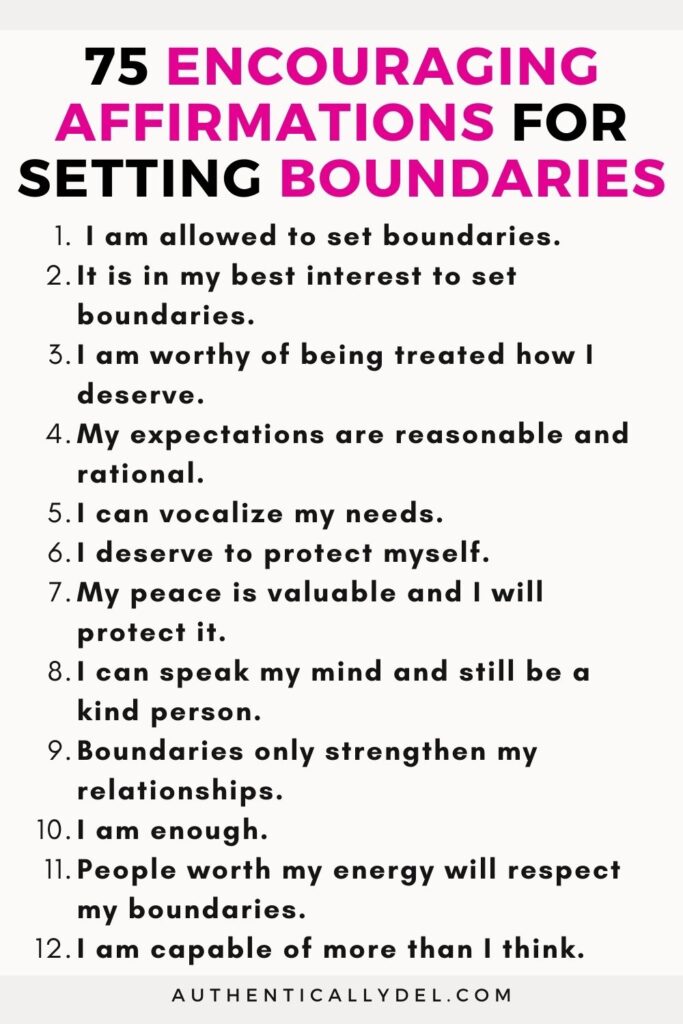
Leave a Reply